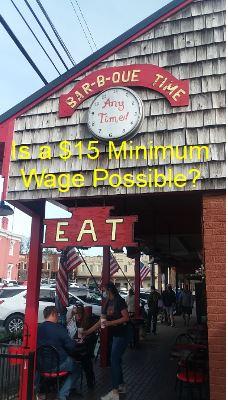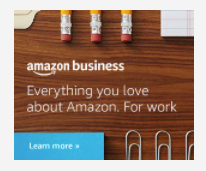
For quite a while, politicians and advocacy groups have been lobbying for a $15 minimum wage. It has actually been tried in limited circumstances, like at the Seattle Airport. It is also a prominent feature being pushed as part of the newest Coronavirus Relief Package. But the question is whether a $15 minimum wage is even economically possible.
(Note, this site contains affiliate links. As an Amazon Associate I earn from qualifying purchases. When you click on an affiliate link and buy something, The Small Investor will get a small commission for the referral. You are charged nothing extra for the purchase. This helps keep The Small Investor going and free. I don’t recommend any products I do not fully support. If you would like to help but don’t see anything you need, feel free to visit Amazon through this link and buy whatever you wish. The Small Investor will get a small commission when you do, again at no cost to you.)
Now, we’re not really talking about the numerical pay of $15, or at least we shouldn’t be. Yes, we could set the minimum wage at $15 and companies would need to pay out $15 an hour as a minimum, but if the cost of everything goes up such that you can only get for $15 tomorrow what you can get for $10 per hour today, you might see $15 per hour on your paycheck but it would be exactly like getting $10 per hour now. If your rent, car payments, utilities, clothing costs, and food costs all go up by the same percentage, you wouldn’t be getting anywhere. If it cost $80,000 per year as a bare minimum to raise a family in a city you’d be getting paid more numerically but it would then cost $120,000 per year to raise a family. You still wouldn’t be able to afford to raise a family because everything would cost more.
What we’re really asking is, can we make it so that someone spending 1 hour of their time working at a minimum wage/minimum skill job trade their labor and get more stuff? Can a person who is now working 80 hours per month to pay for an apartment work 60 hours and get that same apartment? Can they get three fast food hamburgers for each hour of work instead of two? Can they get a meal at Red Lobster for 1.5 hours of work instead of two? Unfortunately, the answer is probably not, at least for many workers, and trying to do so would end up hurting the people you’re trying to help by raising the minimum wage: the workers. Let’s look at how.

(If you enjoy The Small Investor and want to support the cause, or you just want to learn how to become financially independent, please consider picking up a copy of my new book, FIREd by Fifty: How to Create the Cash Flow You Need to Retire Early This is the instruction manual on how to become financially independent.)
The basic economics of a hamburger
To understand why, let’s look at the basic economics of a minimum wage job, or really any job for that manner. The money that comes in and can be used to pay employees comes from the money customers pay for the products. There is no magical source of money that can be used to pay employees if the business is not selling enough hamburgers, car washes, or whatever it is to pay the employees. It isn’t like the owners are going to be taking money out of their bank accounts each month to cover the difference, and even if they did, eventually their bank accounts would be empty. Many business owners also start way in debt, so they could not even get the business off the ground if they were making up for the money the business was losing themselves. So, if a company is paying an employee $15 per hour, it must be making at least $15 per hour on average for the hours they are paying that employee. We showed in Can McDonald’s Pay $15 per Hour? that they are making about $13.25 per hour per employee on average, so they fail this test right off.

Business owners also need to pay for a lot of other things besides employees. They need to pay the cost of the product (typically 25% of the sale price in the food industry), utilities, rent, advertising, insurance, accounting, postage, tax and payroll preparation, benefits, and for maintenance of the business and remodeling periodically. They also need to pay the salaries of any managers, which must be higher than the salaries of starting employees (or why would anyone take on the extra responsibility and headaches of being a manager?).
For it to be worth the while of the owner, they also need to make enough of a profit after they have paid for everything. The owner of a business usually takes out huge loans (and takes a huge risk), needs to figure out the best way for the business to run, needs to keep a qualified staff, needs to deal with the employees and the customers, and needs to be there and fill in where ever needed. If there is a crisis, the business owner will probably need to drop everything else in her life and live at the business until it is solved. She isn’t going to do this unless he/she is making enough of a profit to do so. Otherwise, she would just get a regular job.
If the business is owned by a corporation, then the shareholders are the owners. They hire CEOs and a suite of officers, all of whom get paid fairly high salaries when compared to the entry level workers. The owners could try to pay them substantially less, but they would then lose the better officers to other companies because those companies would be willing to pay them more as long as there is enough companies for their to be competition for officers. And just like the entry level workers, if the cost of things goes up such that what they can buy with an hour of their pay decreases, officers will want their salaries to go up as well to keep their spending power at least the same. The shareholders will then want to receive enough of a profit in the form of dividends to justify leaving their money in the company. If there is not enough of a profit, they’ll sell out and invest their money somewhere else.
So, the bottom line is that the business needs to make enough money to cover everything, which sets a limit on how much they can pay entry level workers. In the case of McDonald’s, that’s about $10 to $11 per hour, which isn’t bad when you consider that they’re only making about $13.25 per employee per hour. The employee gets to keep between 75% and 83% of the income they’re generating for the business. To put it another way, they’re paying the business between 17 and 25% of the money they make in exchange for the business taking care of everything needed for the employees to be able to just walk in the door each shift and make money. This makes sense since they know they can make a lot more money working at these businesses than they could doing something on their own, given their current level of skill, plus they would then need to take care of all of the things the business owners are doing for them.

Want all the details on using Investing to grow financially Independent? Try The SmallIvy Book of Investing
What happens if you raise the minimum wage?
So, the minimum wage a business will pay is set based on how much a business can pay entry level employees after they pay for all of their other expenses. Competition for workers drives the wage up as high as it can go before the profit from the business drops to the point where it is no longer worth doing for the owners. If an employer is paying too little, another employer will start paying more and employees will leave, forcing the original owner to raise his wages. This continues as long as the employers don’t collude to fix salaries and as long as their are enough businesses competing for employees until it reaches its maximum value. If there is collusion or not enough competition, and there will be enough competition as long as there are no barriers to others starting businesses, some employees will see that they could make more on their own, open a business, pay more in salaries and steal the best employees from the existing businesses. So, what you want as an employee is free and fair competition and the ability for whomever wants to start a business.

Need to catch up on your reading but don’t have time? Are you a big fan of listening to books and podcasts? Try Audible Plus
The minimum wage set by the state and the country will typically not really have an effect on the minimum wage the company pays because it is usually set below the true minimum wage the company must pay to attract enough good workers. If you set the minimum wage at $7 per hour but no employer actually pays less than $8, at least after an initial training period to determine if the employee will do a decent job, then really the minimum wage doesn’t matter. Employees know that if they’re left at $7 per hour for too long, they can get another job and make at least $8, so businesses will need to pay more or never be able to keep the staff they need to operate.
But if the government raises the minimum wage above this level set by the market, something needs to give. Again, the company needs to pay for wages and everything else out of the money they get from customers of the business. There is nothing else they can do that will work for more than a very short period of time. The company will need to 1. cut costs, 2. raise prices, or 3. reduce profits. In actuality, a combination of the above will probably occur.
Cut costs
One way a business can make the math work is to cut costs. They can do some things like reduce the quality of the products, but there is only so much they can do before they start losing customers since now the customer is expected to pay the same amount for an inferior product. They can try to save money in other ways like raising or lowering the temperature to save on utilities or make their processes more efficient, but these things are probably as optimal as they can be already since they were already trying to minimize costs before the wages were raised. Usually the answer is to cut hours and/or workers because labor is the biggest cost.
If there are hours where the business is making substantially less, they may close during those hours since they are paying out more in salaries during those hours than they’re bringing in. For example, maybe a restaurant will only be open from 12 until 3 and then 6 until 10. This means that workers get fewer hours and they might have the hassle of a big gap in the middle of their shifts. If you were making $10 per hour before the wage increase and working 40 hours, you might now be making $15 per hour but only working 25 hours. Sure, you don’t need to work as hard, but you’re not making more money, meaning it is still just as hard to pay for things. You might also lose your job entirely since it is cheaper for the boss to pay fewer workers to work more hours than more workers to work fewer hours since each worker has an overhead cost. Less hours is not good for the workers.

Another possibility is to reduce the number of workers, only keeping those who produce more. If you have three workers who are really busting it at work and two others who are just doing the minimum, the boss may decide to get rid of the two and keep the three best employees. Because employees are more efficient once they have experience, this will make it hard for people to get entry-level jobs. Sure, employees may be getting $15 per hour, but the only ones working are the ones who would be getting $15 per hour anyway because they are experienced and generate enough money for the business to justify that wage. Everyone else would be shut out, not able to get that entry-level job needed to get the experience to get a higher-paying job. Jobs would also go to people with connections to the owners first since there were so few jobs to be had.
Another possibility is that the boss will replace employees with technology. All technology solutions require an investment to buy them and then maintenance costs to fix them as they break. If wages are low, the employer will decide it isn’t worth making the investment. If wages increase, suddenly that kiosk that can replace someone taking orders at the counter or robotic fryer that can make 20 burgers at once looks more attractive. You then might have workers making $15 per hour, but instead of having a staff of 6 people per shift, you just have one person who loads the burgers in the hopper and makes sure no one is stealing things from the restaurant. Maybe the owner will just run the place himself and hire a repairman and cleaning service instead of having employees and dealing with the hassle. The business may also become a lot more self-service, where customers use the technology on their own, ordering from a phone app or building their own burger that comes out of a chute.
In cases where hours or employees can’t be reduced enough to make the math work, businesses will just close. This means that everyone working there will lose their jobs and customers will lose access to that kind of business. Many small businesses will fall into this category, meaning more Wal-Marts and mega-chains and less variety and personal service.
Raise prices
So, why can’t the business just raise prices? There are two issues with this solution. The first is that if businesses raise prices, that means that the effective amount that the employees are making decreases. Employees spend their money on things like hamburgers, too, so if all of the restaurants raise their prices, the employee will end up being able to buy the same amount of stuff for each hour he works anyway. This means he may be making $15 per hour, but he can only buy what he could when he was making $10 per hour. And this will not just be fast food, but everything since people will raise their prices when the amount that they need to spend for things increases. If the apartment manager needs to pay more for repairs because the goods and labor she needs to operate go up in price, she will raise her rents. It’s all connected.
There is also a negative correlation between prices and the number of sales. As you raise prices, fewer people will buy the products. Each person makes a choice of what they are willing to pay based on how much money they have and what else they could get for their money. If you raise prices, people will start buying less of the product or switch to cheaper alternatives. They may decide to eat at home or bring a lunch rather than go to the restaurant if prices get too high because that means they need to work more hours to buy lunch (and they may not be able to work more hours, so they need to choose to go without). If their salaries increase such that they can now afford the higher prices, this means the cost of the products they are producing goes up, which, again, means that the spending power of those making $15 per hour decreases. Sure, the fast-food workers got a raise, but they can’t buy more than they could before the raise.

If you raise prices, while you’ll sell fewer products, it is true that you will be getting more per product. If the decline in products sold is not too great, this will mean you will be bringing in more more money, which would then allow for higher wages. The issue is that most prices are already set near their optimums to bring in the most money that the markets will allow. This is done already by the free markets where business owners adjust prices until they find where they make the most money for the amount of work they choose to do. If they try to raise prices further, they’ll end up bringing in less money as the number of products they sell drops. This will not generate anything extra to pay workers more.
The only way true wages could rise for entry-lever workers would be for people making more to accept less for what they do. This means that people who go through all sorts of specialized training would need to get paid a lot less. Doctors who go through 12 years of school after high school would get paid only two or three times per hour what an entry-level person would. Business owners, who spend lots of extra time and take on all of the risk and responsibility of opening and running a business, would get paid just a little more than someone right off of the street. A craftsman who spends several hours making something would need to get paid the same as someone working at an entry-level job makes in an hour or two. It would make it really difficult to find people to take these higher-skilled jobs since they would see that it wasn’t worth the additional work. Why improve yourself and take on more responsibility when you don’t get paid much more anyway?
If they had special skills, they would use them for hobbies rather than putting them to work for others to use. Instead of spending years at school and making a huge investment of time and money to become a doctor, people might be willing to get a bachelor’s degree. To do more wouldn’t be worth it. Your doctor might not know much more than your McDonald’s coworker. Not good for a brain surgeon.
The same would happen with skilled craftsmen. The guy fixing your plumbing might just be an entry-level worker who knows nothing about what he’s doing and destroy your house. Or maybe you wouldn’t be able to find anyone to fix things like your sewer line since it is unpleasant work and doesn’t pay much more than flipping hamburgers. People would find the most pleasant jobs and shun the unpleasant ones because they all pay about the same. There would also not be people making new and better products since there would be no financial incentive to do so. In general, people would be working less and just do things for themselves more, which would mean there would be less for everyone. Farmers would just grow enough food for themselves. People with skills like carpentry or blacksmithing would create things for their own use. There would be no incentive to create things like new machines that can churn out thousands of products per hour because you’d never get your investment back, so things would be done inefficiently. Sure, pay would be more equal, but it would be less all around.

Reduce profits
A final option would be to reduce profits. We’ve already seen that you could only get to $13.25 per hour at places like McDonald’s even if you took all of the profit and paid it out to workers, so you wouldn’t get to $15 per hour even then. If you cut the profits from an individual owner too much, eventually he will decide it isn’t worth doing. He will then close down the business and open something he can do without workers, meaning there will be fewer entry-level jobs, probably going first to the owner’s family and friend’s kids. Again, because of the free market system, as long as their is sufficient competition, the profit owners make is probably near that minimum already. If you try to reduce it further, you’ll see fewer businesses that hire workers as places close down. This would continue until those left can charge enough because they have few competitors to make enough of a profit to justify running the business. Only the best workers would have a job and everything would cost more because of lack of competition.
If it is corporate owned, if you cut the profits shareholders receive, they will be less likely to invest. Cut it enough and they’ll decide to just save their money instead of putting it at risk in a business. For example, if you would receive a 2% return if you invest in a business and it succeeds, but you’d lose your money half of the time, would you invest or put it in the bank where you could get 1%? This would mean that there would be less money to borrow to start businesses, meaning there would be fewer businesses. Again, this means fewer jobs, and levels are already near the minimums due to the free markets. You would see few new businesses, meaning there would be less competition for workers, so those remaining would have less incentive to treat their employees well.

So, raising the minimum wage through government mandate won’t actually result in higher real wages for entry-level employees. Either they are already making more than the minimum wage very soon after starting work anyway, prices will just increase so that employees have the same buying power after the increase as before, or jobs will be cut so those with a job will be making more but a lot of people will be shut out of the workforce and it will be very difficult to find a first job to get the experience needed to get a better job. None of this is good for the entry-level worker. If you want to make more money, you need to learn skills and move out of entry-level jobs into ones with more responsibility that require more experience. Minimum wage is for your first job while you’re learning the skills you need to make more.
Have a burning investing question you’d like answered? Please send to [email protected] or leave in a comment.
Follow on Twitter to get news about new articles. @SmallIvy_SI
Disclaimer: This blog is not meant to give financial planning or tax advice. It gives general information on investment strategy, picking stocks, and generally managing money to build wealth. It is not a solicitation to buy or sell stocks or any security. Financial planning advice should be sought from a certified financial planner, which the author is not. Tax advice should be sought from a CPA. All investments involve risk and the reader as urged to consider risks carefully and seek the advice of experts if needed before investing.
